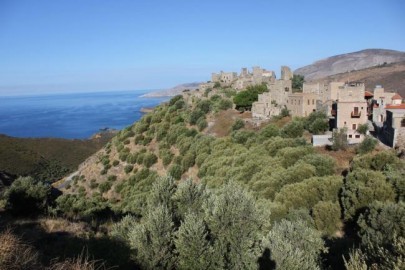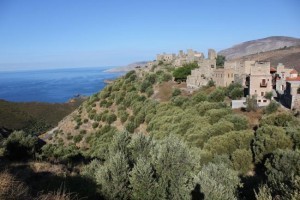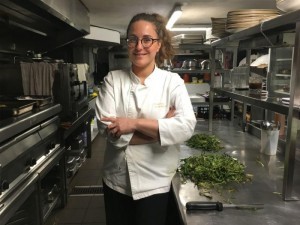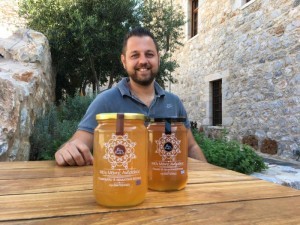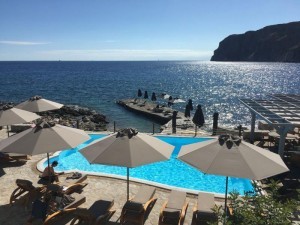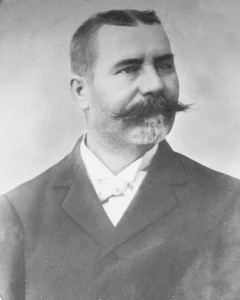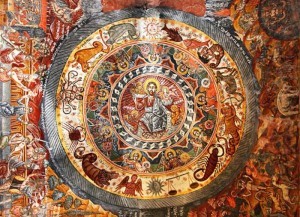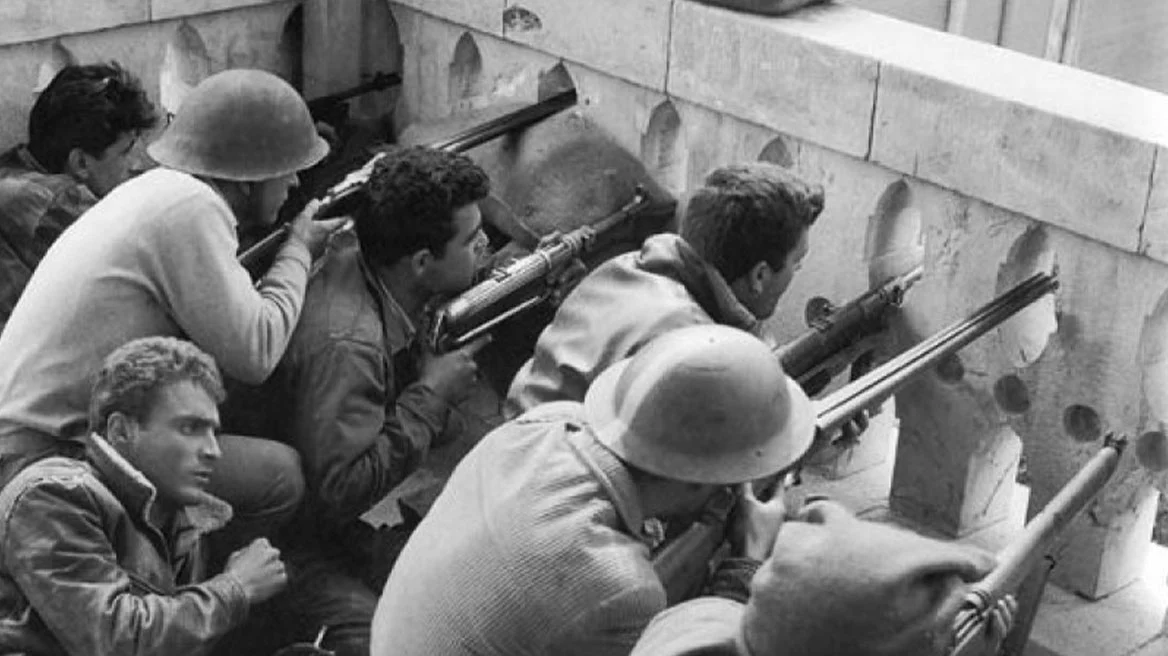By Michael Sweet
The small blue road sign reads “Last Gas Station”. That’s all. No indication of exactly how far away a final chance to refuel may be, no branding, just the indication that this is it; as near to the end of the road as one can be. This is the Deep Mani, the southernmost extremity of the middle finger of the southern Peloponnese. Next stop Libya.
While the Outer Mani, with its coastal towns of Kardamyli and Stoupa is firmly on the tourist map these days, the Deep Mani is another matter. Here is a land of few roads, a harsh coastline of pristine coves and aching beauty, an interior of rugged mountains, and a population familiar with adversity.
(The village of Vathia. Wild and rugged, parts of the Deep Mani have only recently been connected to mains electricity and piped water)
Unsurprisingly the tourism industry here has been slower to develop than the rest of Greece. Little wonder: mains electricity only arrived in the 1990s and piped water a decade later. But today, through the creativity and vision of a handful of enterprising Maniots, life here and the Mani’s prospects have changed immeasurably.
Nowhere is that being experienced more than through the creation of a new Maniot cuisine. Stavriani Zervakakou (38), Head Chef at the Kyrimai hotel in Gerolimenas is in the vanguard of this phenomenon. Though born and raised in Athens, Zervakakou’s ancestral roots are embedded in a village nearby, giving her an intimate connection with the area and its culinary traditions.
“Our bonds with our grandparents who lived here, with our land, was always strong,” says Zervakakou.
“Though I trained as a cook my cooking was really something I learned from my grandmother’s sisters. They were so passionate about their food and they taught me the importance of good raw ingredients.
“I remember the flavours of their dishes – the wild greens, rabbit, and snails, but Maniots in the past felt they had nothing special to display to the world as far as gastronomy was concerned, but it’s not true. There are many similarities with Basque cuisine.”
(Reinventing Maniot cuisine: Stavriani Zervakakou, Head Chef at the Kyrimai Hotel in Gerolimenas)
Zervakakou’s dishes are rich adventurous creations with seafood a regular feature. Think scallops with black polenta, orange-scented sausage and samphire; rich casseroles of wild rabbit and lamb, with mizitra cheese and olives; stamnagathi with grapes and pomegranite, and desserts like rizogalo with cardamom and green lemon. Sourcing the best ingredients, as learned from her great aunts is of course vital for the young chef. It’s a task undertaken not only to honour their advice and get the authentic taste of the Mani, but to help the local economy.
One such supplier is honeymaker Yiorgos Andreikos (34), an economics and IT graduate from the nearby town of Areopoli. Unable to find work in the banking sector as a result of Greece’s economic crisis, Yiorgos went back to college to study the art of bee-keeping, before setting up 200 hives which now produce around 2,000 of liters of honey a year. Currently Yiorgos sells only to Kyrimai and a handful of other hotels in the region. His sweet delicacy sells for 12 euros a liter and it’s a business with much potential, but investment – in more hives and machinery, along with marketing and distribution – will be crucial to its growth.
(Because of the Greek economic crisis, graduate Yiorgos Andreikos returned to the Mani to start a honey business, after finding few employment opportunities to use his qualifications)
That Kyrimai found Zervakakou and was able to bring her talents to the Mani is a fortunate stroke of serendipity. Praised for her work in Istanbul before she returned to Greece, the hotel has provided the perfect platform for her skills. In recent months Kyrimai added to its many awards, reflecting the growing praise for its inspiring food, by winning the coveted Gourmet prize for 2018 bestowed by the Historical Hotels of Europe organization.
A member of the Yades Greek Historic Hotels group, Kyrimai’s ethos is all about providing guests not only great food, luxurious comfort and high-quality customer service, but also deep insights into the history and culture of the Mani. The history of the hotel itself is remarkable – a stirring narrative that reflects so much about the Mani and its 19th century pioneers – the men and women who overcame hardship and isolation to build a better life – not just for themselves but their community.
(The Kyrimai hotel sits proudly at the entrance to the tiny port of Gerolimenas)
Kyrimai’s story is that of one family whose vision and perseverance established Gerolimenas as a 19th and early 20th century international trading center. One hundred and forty years after its creation that same family and pioneering spirit has made Kyrimai a shining beacon of excellence and commercial success in the region.
The story of Kyrimai
In the 1870s two traders – Michael Katsimantis from the island of Syros, and Theodore Kyrimis, the mayor of middle Mani, created at the tiny village of Gerolimenas a maritime trading business, importing and exporting goods throughout Greece and the Mediterranean. Katsimantis and Kyrimis established a triangle of trade between Syros, Pireaus and Gerolimenas, and as the business developed, it provided a vital sea route to import timber, medicines, fabrics and hundreds of other products to the then 50,000 residents of the Mani peninsula.
(Theodore Kyrimis, the pioneering Mani entrepreneur)
Today the stone warehouses, once stacked with goods for import and export (at one point 70,000 live quail, were being exported annually to Marseilles), have been beautifully restored to make up the buildings which house the elegant Kyrimai hotel. It is still owned by the Kyrimis family.
Derived from the Byzantine root of the Kyrimis name, Kyrie imon (our Lord), since it opened Kyrimai has been an ongoing experiment in cultural reconnection as much as a commercial venture.
Honouring the legacy of Michael Katsimantis and Theodore Kyrimis, Kyrimai opened a new chapter in the story of the Deep Mani, written by brothers Alexandros and Aris Kyrimis – two great-grandsons of founder Theodore.
Speaking in Kyrimai’s waterside dining room, Alexandros takes up the story.
“It was a big adventure. We didn’t have experience of operating a place like this, we weren’t from a hospitality background but we knew what would make guests happy.
“In the 1990s most Greeks couldn’t point to Mani on the map, because of its infrastructure problems that kept it back in time. We weren’t sure what to do with the building but we thought if we could do something nice it had potential, even though it was so remote.”
After spending 450 million drachma (€1.2 m) on renovations (with half the funds coming from the EU and government restoration programs), work began on creating the Kyrimai hotel in 2000. It opened in 2003.
Promoted to the domestic market first when Greece was still enjoying a relatively stable economy and Greeks were traveling more than ever, Kyrimai’s reputation grew, and despite its isolation, appealed to Athenians in search of new adventures. “For them it was something great in an area they didn’t know much about,” says Alexandros.
The late 2000s saw more renovation and a focus on developing the restaurant, with new chefs tried to evolve Kyrimai’s menus and to develop its distinctive food offerings. By 2009, with the economic crisis beginning to take its toll on the domestic tourism market, the Peloponnese began attracting international attention on a scale unheard of before, driven by the opening of two more high-end hotels – the Costa Navarino Resort south of Kalamata, and Kinsterna at Monemvasia.
“There were a lot of media visiting the area,” remembers Alexandros. “The Peloponnese was suddenly in the news abroad, Kalamata airport was getting more flights, and we got a piece of that pie.”
Since then, that slice of pie has grown, with Kyrimai’s mix of rich ingredients making it one of the pre-eminent luxury hotels in the Peloponnese. Today international visitors provide the backbone of its guests, drawn to the hotel’s sublime waterfront position, its unique heritage, and more recently, the creations of its inventive young chef.
But beyond the gourmet delicacies and delicious creature comforts, beyond the beckoning crystal clear waters that lap at the hotel’s edge, a visit to Kyrimai is an unforgettable journey – an act of time travel through its 140-year story, and the history of the Deep Mani.
(Mani treasures: 18th century fresco depicting Christ surrounded by the signs of the zodiac at the Dekoulou monastery, near the village of Oitylo)
Getting there
While the outer Mani’s isolation is legendary, it’s a lot more accessible these days. A new bypass at Sparta cuts the journey time from Athens airport to Gerolimenas by road to around 3.5 hours.
Source: neoskosmos
Ask me anything
Explore related questions
